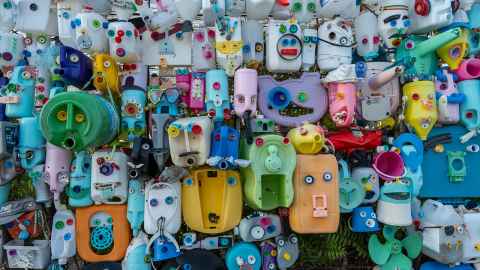The oxymoronic underpinning of green consumerism
17 June 2024
Opinion: There's no buying out way out of our environmental crisis, says Gabriela Baron, and the idea that individuals can fix things by buying eco-friendly goods is dangerous.

To genuinely tackle the climate crisis, we need to focus more on cultural, behavioural, and policy changes rather than relying on technological solutions. The sooner we accept the fact that we can’t buy our way out of the situation through ‘green consumerism’, the more effective our policy strategies will be.
In the past half a century, we have been part of a significant shift from a production-focused society to one driven by consumption. Consumer culture and marketing have emerged as dominant forces, driven by consumer confidence and credit availability, rather than production efficiency.
This shift has dramatically altered personal identity and cultural development. Modern advertising has evolved from promoting a product’s practical features to creating symbolic connections between products and consumers’ psychological states, harnessing human psychology, and targeting emotions such as guilt, inadequacy, aspirations, and identity. Often, the strategy involves creating a new crisis in order to sell a product that promises to solve it.
This strategy ensures that consumers remain in a perpetual state of unfulfilled desire, while products and brands fail to fulfil their promises. Shopping, once a practical necessity, has become a quest for status and self-creation through brand association. This endless cycle of desire and consumption is a hallmark of modern capitalism, where purchasing has even become a form of (retail) ‘therapy’. The gap between what is bought and what is used highlights the psychological and social dimensions of waste.
The latest sense of inadequacy that marketing experts are tapping into is environmental or climate anxiety – the chronic fear, distress, and depression that individuals feel about environmental degradation – and the planet’s uncertain future. This is often compounded by feelings of guilt and responsibility, especially among those more aware of how their choices contribute to the climate crisis. People try to make behavioural changes to alleviate this feeling, like sorting their waste and consuming responsibly. In other words, we indulge in ‘green consumerism’.
Green consumerism, promoted by NGOs, businesses, and governments, encourages people to buy environmentally friendly products to help them shift towards more sustainable habits. The idea that we can buy our way out of our current crisis carries significant dangers. It tends to focus on individual responsibilities, rather than mobilising people to address systemic issues driven by the main culprits of environmental degradation: large corporations and liberal economic policies.
The impacts of greenwashing in recycling are significant, hindering effective environmental progress by diverting public policy and resources from genuinely effective environmental solutions.
This shifts the onus onto the individual, rather than institutional change, commodifying social conscience and encouraging people to express environmental concerns through ‘green’ purchasing power, rather than collective action. This is ultimately disempowering, as it conflates consumer roles with citizen roles, failing to draw the line between market and policy.
Finally, green consumerism still focuses on selling us stuff we don’t need. Having said this, green consumerism is still preferable to ‘regular’ consumerism, but only if individuals can jump the hoops of greenwashing, which adds another layer of complexity to responsible consumption.
Greenwashing is a deceptive strategy where companies or organisations promote their products, services, or practices as environmentally friendly to gain consumer approval and market advantage. This often involves overstating or falsely claiming the environmental benefits of their products, misleading consumers into believing the company is more sustainable than it actually is. This distorts the market for genuinely green products, which struggle to compete against those engaging in greenwashing.
There are common and recurring themes in greenwashing. Companies may use ambiguous language and ‘self-certifications’ to make environmental claims, using vague terms like ‘eco-friendly’ or ‘green’ without providing specific, verifiable information, often through labelling that looks similar to official regulation bodies.
Take, for instance, products labeled ‘recyclable’ even if no facilities are available to recycle them properly. Many plastic items are marked with the recycling symbol and a number, yet only a few types of plastics are widely recyclable. The products will likely end up in a landfill. The impacts of greenwashing in recycling are significant, hindering effective environmental progress by diverting public policy and resources from genuinely effective environmental solutions.
Can we cut through the spin? While waiting for proper regulation, we can only scrutinise claims made, look for verifiable information about a product’s environmental impact, and research third-party certifications and independent reviews to verify environmental claims, which is an exhausting task. The most leverage we can have is through political participation, calling for genuine change, sanctioning, banning, or taxing the big corporations that are deceiving us and degrading our environment.
The greed of global corporations paired with a system that celebrates eternal economic growth has proven disastrous. Addressing the root causes of unsustainable consumption requires strategies far beyond green consumerism, into a deep, radical, systems-level shift. Ultimately, we must accept that setting clear limits to economic growth is the most viable path, reassessing our relationship with the natural world, and redefining notions of identity, wellbeing, and success.
Dr Gabriela Baron is a senior lecturer in the Design Programme, and Associate Dean Sustainability, Faculty of Creative Arts
This article reflects the opinion of the author and not necessarily the views of Waipapa Taumata Rau University of Auckland.
This article was first published on Newsroom, There’s no buying our way out of the environment crisis, 17 June, 2024
Media
Margo White I Research communications editor
Mob 021 926 408
Email margo.white@auckland.ac.nz